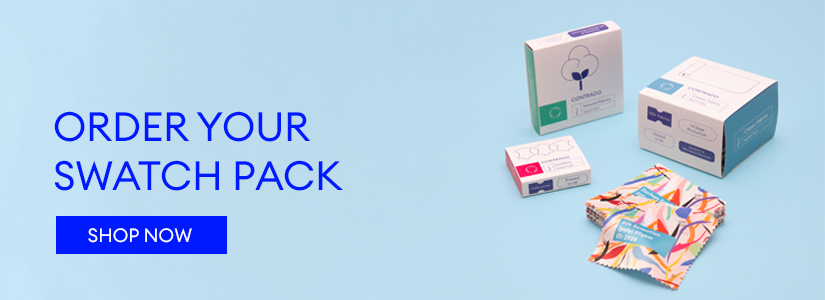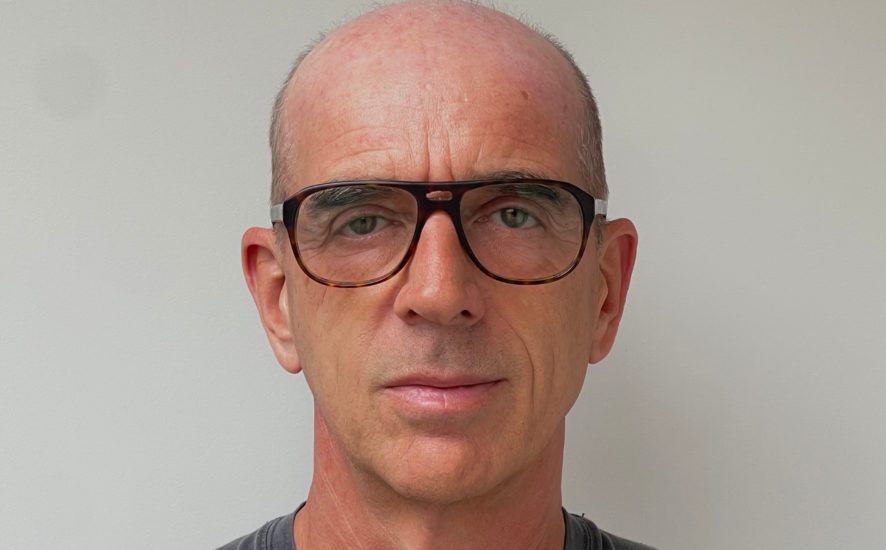The Expansion of Mass Customisation and Its Standard Offering
Contrado, the London-based printing company, founded in 2002 by Chris Childs and Fran Rodriguez, has grown exponentially, catering to both B2B and B2C customers worldwide. With a cutting-edge production facility, Contrado specialises in creating high-quality custom products, including printed fabrics, garments, and homeware. In an exclusive interview with us, Founder Chris Childs shares insights into the custom printing and manufacturing industry and its future.
Q: How has the emergence of online custom printing and manufacturing platforms impacted the traditional supply chain and production methods in the textile and apparel industry?
A: Since launching our Direct-to-Consumer model in 2002, Contrado’s online custom printing and manufacturing platform has thrived, revolutionising the industry. By connecting consumers directly with us, we have bypassed traditional intermediaries in the supply chain, eliminating the need for wholesalers, distributors, and physical retail stores. This has resulted in a shorter, faster, more efficient, and sustainable supply chain.
Q: What are the emerging trends and technologies in the custom printing and manufacturing industry that can revolutionise product creation and delivery?
A: Digital textile printing continues to drive innovation, offering increased capacity and superior output quality. At Contrado, we embrace automation and employ state-of-the-art equipment, ensuring efficiency throughout our production process. Being an on-demand manufacturing platform allows us to reduce waste significantly. On the demand side, our platform empowers customers to create designs quickly and conveniently. They can customise various products and receive their purchases within days. On the supply side, new fabric properties, such as temperature and UV regulation, along with wearable technology, present exciting possibilities. We are also exploring the potential of Web3 digital fashion, collaborating with RTKT and RoboGeeks. At Contrado, we aim to enhance consumer interactions through 3D previews of garments and accessories. Additionally, we incorporate data science for smart recommendations, customizations, and marketing strategies, all integrated into our factory flow.
Q: With the growing demand for personalised products, how do you envision the future of mass customisation in the custom printing and manufacturing sector?
A: As technology advances, mass customisation will become more sophisticated and accessible. Advancements in digital printing, 3D printing, and data-driven analytics will empower customers with greater control over product design, materials, sizes, and personalised features. Artificial intelligence and machine learning algorithms will enable brands like Contrado to offer highly tailored recommendations. The integration of virtual reality and augmented reality will further enhance the customer experience. Mass customisation will expand and become a standard offering, with faster production turnaround times, reduced costs, and seamless integration into supply chains, satisfying the growing demand for personalised products.
Q: What are the key challenges that custom printing and manufacturing companies face regarding quality control, scalability, and meeting customer expectations?
A: Consistency in print quality, colour accuracy, and product calibration remains a constant challenge. At Contrado, having our own factory grants us greater control and ensures higher quality standards compared to brands that rely on multiple fulfilment partners. Scalability is another significant challenge, but we successfully navigated it during the pandemic, doubling in size without compromising quality or efficiency. Dealing with defects, product rework, and returns poses substantial problems for many companies. However, as we control the entire production process, from software design to physical manufacturing, we can address and minimise these issues. By utilising the fastest delivery services available, we continually strive to reduce problems and improve customer satisfaction.
Q: How do you envision artificial intelligence and automation shaping the custom printing and manufacturing industry in the coming years, and what impact will they have on job opportunities?
A: Artificial intelligence (AI) is still rapidly evolving, and its full extent is yet to be realised. However, we expect AI to drive significant changes, particularly in artist design recommendations, colour matching, and enhancing customer experiences through recommendation engines and algorithm-powered decision-making. At Contrado, automation plays a vital role in our efficiency. Fully automated print workflows, enhanced quality control, and reduced human error contributes to our speed and accuracy. While certain job roles involving repetitive operations may be reduced, new positions will emerge in operations management, workflow leadership, and data insights implementation. The entire spectrum, from factory operations to marketing strategies, will be positively impacted, enhancing overall efficiency and productivity.
Q: What inspired you to start Contrado, and what were your goals at the company’s inception?
A: Our journey began with the desire to print our child’s pictures on custom products—a thrilling concept back in 2002. We envisioned creating high-quality, personalised merchandise that was not typically available. Our goal was to revolutionise the way people shop for custom products. Today, after two decades of innovation and creativity, Contrado continues to improve and excel.
Q: How has Contrado evolved since its establishment, and what significant milestones have you achieved?
A: Contrado’s journey since 2002 has been a remarkable evolution. Starting from our home, we faced financial constraints, but we gradually established our own micro production centres, mastered new techniques, and expanded our team. Major milestones included developing our e-commerce platform, expanding our international reach, streamlining factory workflows, and introducing a diverse range of products. Today, with a full-service production facility, a dedicated team, and exceptional digital systems, we are poised for continued progress and future milestones.
Q: What sets Contrado apart from other companies in the industry, and what unique value proposition do you offer customers?
A: Contrado’s organic growth, self-funding, and focus on in-house production differentiate us from our competitors. Unlike brands that outsource manufacturing, we only produce in our own factory, allowing us total control over quality and customisation. Our commitment to providing an end-to-end solution sets us apart.
Q: Can you explain the process of creating a custom-made product on Contrado’s platform? What options do customers have?
A: Our bespoke IT Designer interface enables users to select any of our products and begin the customisation journey. Whether designing a bomber jacket or a dress, customers can choose the gender, size, and fabric type, including silks, velours, and waterproof materials. They have the freedom to design different parts of the product, from front to back panels, and view a 3D preview of the final design. For businesses, adding custom branding elements like labels and swing tags is also possible. Once the design is approved, our systems initiate the print and manufacturing process, from maker benches to quality control, resulting in delivery within 2-4 days.
Q: How does Contrado ensure the quality and durability of its manufactured products?
A: Owning our factory empowers us to establish and maintain rigorous quality standards. With two decades of experience, we have honed our textile selection process to meet specific product requirements. We prioritise printability, conduct rub tests, ensure fastness, and perform necessary safety assessments. Our continuous investment in print technology, ink selection, colour management, and overall print quality contributes to the durability of our products. Rigorous quality control and our skilled craftsmanship also play a pivotal role in maintaining exceptional standards. We offer extended guarantees, further solidifying our commitment to quality.
Q: In what ways does Contrado prioritise sustainability and ethical practices in its production processes?
A: Our on-demand production model inherently promotes sustainability by minimizing waste. As a London-based company, we adhere to rigorous regulations governing consumer safety, environmental concerns, and health and safety standards for our team. To reduce waste, we recycle and repurpose fabric remnants, minimizing landfill impact. Our manufacturing-on-demand approach avoids the issues associated with unsold stock, contributing to a more sustainable industry.
Q: How does Contrado foster customer satisfaction and maintain strong client relationships?
A: Our formula for customer satisfaction is simple—create captivating and high-quality products that make people happy. We actively listen to our customers, incorporating their feedback and ideas for continuous improvement. Our CRM systems and cohort processes encourage customers to explore and try new offerings over time. Additionally, we cater to business needs, supporting testing, short runs, and reselling through our B2B model.
Q: Can you provide a sneak peek into Contrado’s future plans? Are there any new features or developments in progress?
A: Our innovation team is constantly enhancing our products and services. We aim to introduce exciting new items that elicit a sense of wonder. Furthermore, we will continue expanding our data-driven platform to enhance user engagement. Contrado remains committed to pushing the boundaries of creativity and customisation.
Q: Reflecting on your role as the founder of Contrado, what were the most significant challenges you faced, and how did you overcome them?
A: Building a business from scratch poses immense challenges, particularly due to limited financial resources. However, with the right vision, passion, and dedication, these obstacles can be overcome. We persevered through financial limitations, established our production centres, and expanded our knowledge base. Overcoming hurdles such as managing and updating our IT infrastructure and scaling without external investments required strategic planning and operational efficiency. Today, Contrado’s success is a testament to our commitment to innovation and our ability to provide exceptional custom products.


